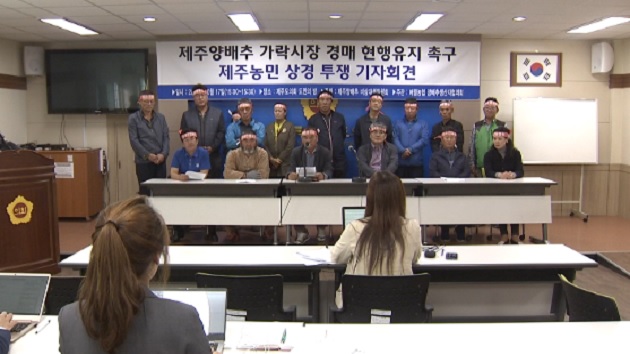
Garak Market in Seoul now requires farmers to ship their produce there on pallets. Local cabbage growers say that makes shipments too expensive for them. Joseph Kim reports.
[slug]
Aewol-eup, Jeju City
Mr. (김수한) Kim Su-han has grown cabbage for 15 years.
He has a concern on shipments of the vegetable that begins in December.
[slug]
Garak Market now requires shipments arrive on pallets
This year, the (가락) Garak Market, the nation’s representative public wholesale market, has changed policies on their unloading system.
[slug]
More trucks needed to handle pallet-based shipments
Before the change, cabbages were transported from the island to the market on a shipping container without pallets.
Beginning this year, farmers have to put net bags of the vegetable on a pallet for a forklift truck to unload them at (가락) Garak Market.
This means more trucks are needed and a higher distribution cost incurred.
INTERVIEW
Kim Su-han / Cabbage grower
400 net bags of cabbage can be loaded into an 8-foot container, but that capacity falls to 250 bags when we use a pallet. This means we need more trucks for the same volume of cabbage.
<인터뷰 : 김수한 / 양배추 재배 농민>
"8피트 컨테이너에 실을 때는 망 400개 정도 들어가는데 팰릿에 작업하면 250개 정도밖에 안 들어가서 (차량 1대 당) 물류비는 똑같은데 양배추 숫자는 덜 들어가서…."
The Seoul Agro-Fisheries and Food Corporation that operates the (가락) Garak Market says a standardized unloading system is needed for the modernization project of the market facility.
The corporation added that the standardized system will make the unloading job easier at the market and crops shipped from other regions of the nation have already begun to use pallet-based transportation.
Recording
Seoul Agro-Fisheries & Food Corporation representative
Pallet-based shipments are required for efficient distribution and hygienic transportation from producers to end consumers.
<싱크 : 서울시농수산식품공사 관계자>
"여러가지 측면에서 물류 효율화라든가 생산자라든가 소비자까지 가는 과정에 있어서 환경 위생적이라든가 이 부분에 대해서는 (하차거래는) 당연히 가야 할 길이죠."
However, the island’s cabbage growers oppose the change.
[slug]
Local cabbage growers oppose new rule
They held a press conference last week to speak out against the pallet-based shipment.
They estimate that the increased cost would tally four billion won annually.
[slug]
‘Shipping costs will go up by ₩4b’
They also argue that the Seoul Agro-Fisheries and Food Corporation will benefit from the change, meanwhile producers will have to bear the burden of higher distribution costs.
Recording
Kim Hak-jong / Chair, Cabbage Emergency Measures Council
Stop disrupting Jeju logistics by boosting shipment fees and putting local farmers in more debt.
<싱크 : 김학종 / 양배추 비상대책위원장>
"유통비용 증가로 농가부채 증가를 조장하며 제주도의 물류대란을 야기 시키는 행동을 중단하라."
[Reporter] Joseph Kim
[Camera] Park Byeong-joon
[slug]
D’Live Seoul/Gyeonggi Cable TV
About 150 cabbage growers held a protest last Friday(Oct.18) in Seoul.
They are now considering suspending shipments of the crop if their demands are not satisfied.
Joseph Kim, KCTV





